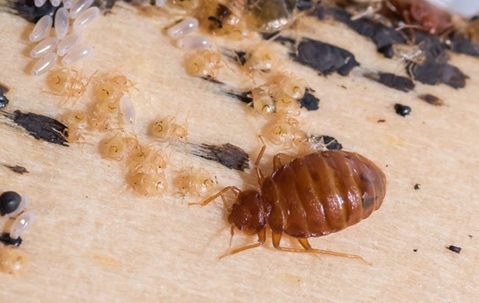Advanced Parasite Control Techniques for a Pest-Free Living Space
While standard pest control methods have their place, the evolution of innovative strategies provides a glimpse right into a future where pest-free areas are not simply a dream but a fact. From Integrated Bug Monitoring approaches to innovative High-Tech Pest Keeping track of Solutions, a new period of insect control is arising.
Integrated Bug Administration (IPM)
Integrated Bug Monitoring (IPM) is an organized strategy that focuses on utilizing different methods to manage pests successfully while reducing ecological impact and economic prices. This method incorporates several bug control strategies such as organic control, environment manipulation, modification of social methods, and using resistant plant selections. By combining these techniques, IPM aims to manage parasites in a lasting and ecologically responsible way.
One trick aspect of IPM is the emphasis on avoidance as the initial line of protection against pests. This includes monitoring insect populaces, identifying potential dangers, and implementing proactive steps to decrease insect infestations prior to they come to be troublesome. By employing preventative procedures, IPM can dramatically reduce the need for chemical pesticides, thus mitigating potential harm to non-target organisms and the bordering community.
Moreover, IPM promotes making use of pesticides only as a last option and in a targeted way. This targeted method decreases chemical use, decreases the danger of chemical resistance in parasite populations, and assists maintain a healthier setting for both people and wild animals. Generally, Integrated Insect Administration stands as an extensive and lasting service for reliable parasite control while focusing on environmental conservation and economic effectiveness.
All-natural Repellents and Deterrents
Making use of natural repellents and deterrents is a sustainable and eco-friendly approach to managing pest populations in numerous atmospheres. Natural repellents work by leveraging fragrances or materials that parasites find unpleasant or overwhelming, driving them far from the area. Pepper mint oil is reliable in deterring spiders, while citrus peels can repel ants. Growing marigolds around a yard can assist keep away parasites like aphids and insects as a result of their solid scent - bed bug exterminator houston near me. In addition, essential oils such as lavender, eucalyptus, or tea tree oil can act as all-natural bug sprays when weakened and splashed around the home.
Physical deterrents additionally play a substantial function in pest control. Straightforward actions such as sealing cracks and holes, setting up door sweeps, and making use of home window screens can protect against bugs from entering living rooms. Additionally, maintaining sanitation by immediately disposing of food scraps and maintaining garbage containers securely sealed can aid get rid of attractants for pests. By incorporating all-natural repellents and physical deterrents right into pest management approaches, individuals can produce a pest-free living space while lessening the environmental effect.
Targeted Bug Exemption Techniques
When executing effective parasite control approaches, targeted parasite exemption methods are vital for avoiding specific pests from accessing or infesting a marked area. These techniques entail determining the susceptabilities that pests might make use of to gain access and executing measures to obstruct their gain access to factors (bed bug exterminator houston near me). By concentrating on targeted insect exemption methods, property owners can create a durable defense versus unwanted invaders, advertising a pest-free living area.
Biological Control Methods

One common biological control technique is the intro of killer pests like ladybugs or bed bug exterminator houston llc parasitic wasps that feed on particular bugs, maintaining their populaces in check. These killers act as a natural type of bug control without the demand for chemical treatments. In addition, microbial pesticides stemmed from naturally occurring bacteria, fungi, or viruses can infect and kill insects while presenting very little danger to people and valuable pests.
Applying organic control approaches calls for a thorough understanding of the ecosystem and the pests present to introduce one of the most reliable all-natural opponents. By integrating biological control into pest management techniques, home owners can attain a pest-free space while advertising ecological balance and reducing dependence on chemical pesticides.
High-Tech Parasite Keeping Track Of Equipments
Advanced digital gadgets play a pivotal function in modern bug control by providing exact and real-time data with modern pest surveillance systems. These systems utilize sophisticated innovation to identify and track insect task, making it possible for early intervention and targeted therapies. Sophisticated pest tracking systems often contain sensors, electronic cameras, and automated data analysis devices that provide unmatched insights into bug behavior and patterns.

In addition, sophisticated parasite surveillance systems are created to be easy to use, with user-friendly interfaces that help with easy analysis of data. By leveraging these innovative devices, parasite control professionals can carry out more effective and sustainable methods, eventually creating pest-free settings for property and industrial areas alike.
Conclusion
In verdict, carrying out sophisticated pest control strategies such as Integrated Parasite Monitoring, all-natural repellents and deterrents, targeted parasite exemption strategies, organic control techniques, and high-tech pest tracking systems can properly produce a pest-free living space. By making use of a mix of these approaches, individuals can prevent and take care of parasite problems in a sustainable and eco-friendly manner. It is crucial to focus on pest control procedures to ensure a healthy and balanced and comfortable living atmosphere.